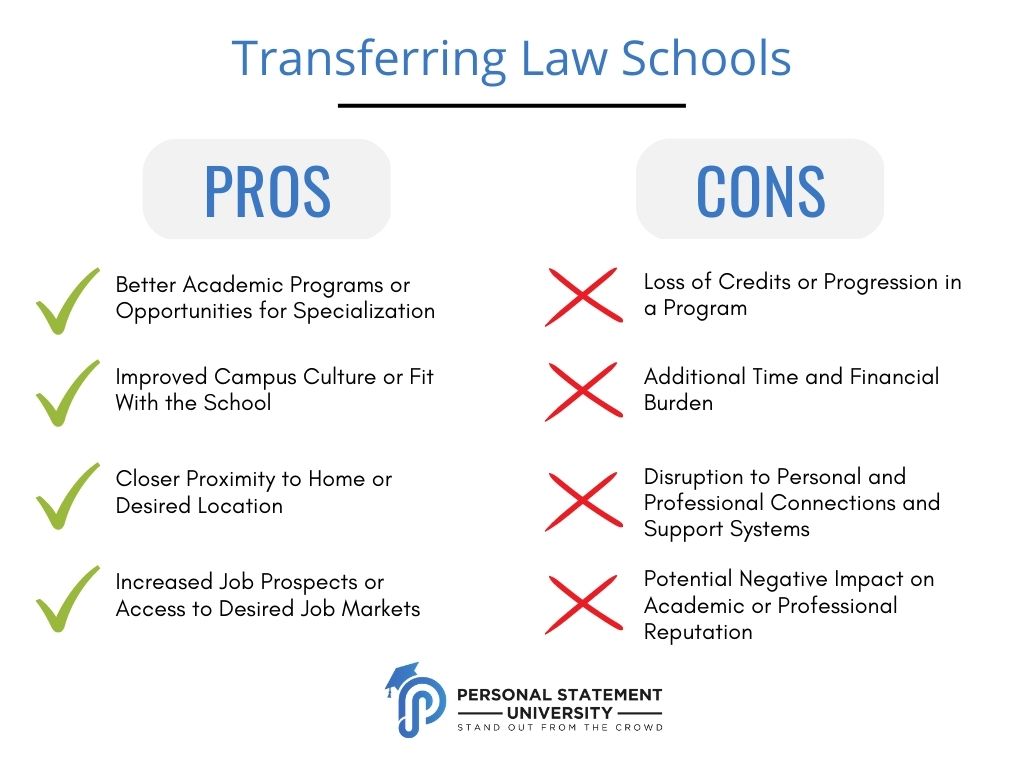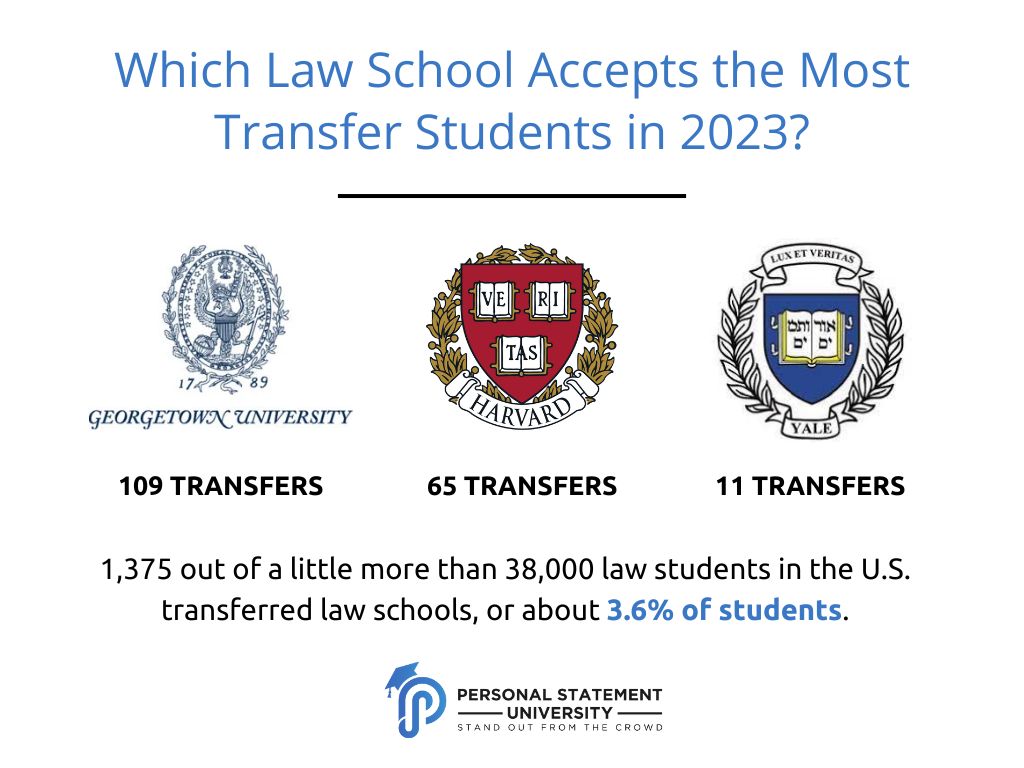Reasons You Should (and Shouldn’t) Transfer Law Schools
Still Confused?
Get in touch with us for
professional guidance.


Should you transfer law schools? Yes, if you do it right and do it for the right reasons.
You’re probably aware that lots of people don’t get accepted to their first choice of law school. Some try again the next year, and some settle for another school in order to start law school right away. But there’s a third option: transferring law schools.
This usually occurs after a student’s first year, meaning the successful transferee will complete years two and three at the transfer school and graduate from that school.
Transferring requires a lot of effort before and during your 1L year, and it’s not a sure bet, so it’s important to carefully consider the pros and cons well before the beginning of your law school career. This post will walk you through how to make that decision and what to do to make sure your transfer application is successful, both in the narrow sense of getting accepted and in the broader sense of enhancing your law school and legal career as a result.

Pros of Transferring Law Schools
Transferring law schools isn’t easy, and there’s no guarantee that you’ll get accepted if you apply as a transfer, but there are some very solid reasons people decide to transfer.
Better Academic Programs or Opportunities for Specialization
The most common reason people transfer is to get into a law school that better fits their interests and experience or to get into one that is more prestigious (usually as measured by its rank in the US News & World Report law school rankings). Regarding the first consideration, it makes a lot of sense that if you are interested in practicing environmental law, for instance, you’d want to go to a school that has a lot of academic, clinical, and volunteer opportunities in that field. If the best school for these relevant experiences rejected you the first time around, you might well have better luck as a transfer. So try again, right?
The other consideration – rank or prestige – matters somewhat in some contexts, but if having the right school name on your law degree is the only reason for your transfer, you may want to reconsider because prestige is generally not that important to most lawyer career paths. The two career paths that prestige matters to are:
(1) getting hired at a Big Law firm right out of law school or
(2) you want to end up a law school professor.
Otherwise, the rank is overblown.
That said, rankings are based at least partially on important factors like a school’s bar passage rate and employment rate, so make sure that any school you’re going to spend even one year at has good employment and bar passage statistics, even if it’s not highly ranked.

Improved Campus Culture or Fit With the School
Have you ever visited a place and thought, “I belong here?” While it’s not always possible to visit every law school you plan to apply to, especially if you’re applying nationwide, vibes are important, especially when you’re going to be doing three years of challenging academic work in the midst of those vibes.
And that’s not limited to the feel of the campus because, really, a law school is just a collection of people. To the extent you can, it helps to get to know a student or two at a law school you’re considering because they can tell you from firsthand experience what it’s like to be a student there. Is it a collaborative environment or more competitive? Is there nightlife, or is it a more studious and sleepy atmosphere? Each school has a culture and personality, and it’s important to find a good fit.
Closer Proximity to Home or Desired Location
There are great law schools in every state in the nation, but some need to be near family or a significant other’s job, and in those cases, their choices might be limited. Getting closer to where you need to be might be a good reason to transfer, even if you have to go somewhere other than your desired location for the first year.
And some people use law school as a springboard to live in a place they’ve always wanted to live in, even if they don’t end up staying after law school. Plenty of people end up at one of New York City’s many, many law schools because they want three years of city life or, in the case of a transfer, two years of city life.
Increased Job Prospects or Access to Desired Job Markets
The practice of law is segmented by jurisdiction. That means that an attorney who has a license in one state usually can’t just pack up and start practicing in another state without taking the bar exam a second time, which is no small feat. For that reason, it can make a lot of sense to figure out where you want to practice after law school and go to school in that jurisdiction.
And most law schools have a well-staffed career services office that has connections with employers in the local legal market, so if you know you want to practice in that market, transferring to a school in that market can make your transition to working as an attorney smoother.
Cons of Transferring Law Schools
Transferring is not easy, nor is it guaranteed, so carefully weigh the downsides before committing to a plan to transfer.

Loss of Credits or Progression in a Program
Needless to say, the several hundred law schools in the United States are not uniform members of a standardized system of legal education. That means that the credits and/or grades you earn at your first law school aren’t automatically guaranteed to transfer to your transfer school. So, if you’re considering the transfer path, you need to make sure that the classes you take in your first year will transfer.
Additional Time and Financial Burden
If you end up not being able to transfer enough credits, law school could end up taking you more than three years, which would mean more tuition payments and longer until you can start paying back loans. That could end up costing a lot of money in the long run, especially if you’re paying interest, not to mention the extra time in school.
As you’ll see below, doing everything you need to do to complete a transfer is time-consuming, and you’ll be doing a lot of those tasks while trying to get good enough grades to transfer. Getting good grades in law school is hard, even when you’re attention is not divided. Needless to say, transferring law schools is not for low-energy types.
Disruption to Personal and Professional Connections and Support Systems
Success in law school requires more than just getting good grades. You’ll build relationships with your fellow students, especially those in your section. (Law schools usually group first-year students into teams called “sections” that take classes and study together, and those relationships can last a lifetime.) You’ll build relationships with professors and lawyers who are associated with the school in order to open career doors down the road. And you usually get your first substantial work experience in the summer between your first and second years of law school.
All that can get thrown off-track by transferring. Especially if you’re considering moving your home in the transfer process, not just attending a different law school, you might not be able to complete a summer position, which can set you back on your quest to get a good job in a competitive job market. And those relationships you built your first year probably won’t go very far at your new school. And when it comes to building relationships at the new school, you start a year behind. Not ideal.
Potential Negative Impact on Academic or Professional Reputation
If you’re worried that you’ll be seen as insufficiently loyal to your educational institution or that transferring will otherwise reflect poorly on your moral character, you’re probably overthinking it. Transferring won’t hurt your reputation in and of itself.
But you have to make sure you do it right. If you participate in student groups during your first year of law school, for example, other members might be expecting you to be around for three years, and you have to make sure you’re not making commitments you’ll end up breaking.
How to Decide if Transferring Law Schools Is Right for You

Consider Your Personal and Professional Goals
It’s easy to romanticize your dream law school, as though getting into that school is the point. But the point of law school is not to go to any particular law school. No, the point of law school is to be a lawyer, of course. And as long as you get into any reputable law school, you’ll be a lawyer.
So, if you’re thinking about transferring, ask yourself: How will transferring help you become a lawyer? If you don’t have an answer to this question, you’re likely considering making law school significantly more difficult for no good reason other than you want to be able to brag about the exclusive law school you graduated from.
A legitimate answer to that question usually comes from having a firm vision of the type of law you want to practice and then transferring to a school that has a rich diversity of opportunities relevant to your career goals.
Research and Compare Programs and Opportunities at Different Schools
Ideally, if you’ve got your eye on transferring, you have a pretty good idea of what it is about the school that you’re transferring to that makes it better than the ones to which you were accepted. And if you’re transferring to a school, you’ve likely already applied to that school at least once.
What that all means is that you should likely have done this step already because a good law school application talks, especially in the personal statement, about how the applicant will participate in a meaningful way during law school. The best way to do that is to find the programs that interest you and tie your experience and education directly to those things. But, just to refresh your memory, here is a non-exhaustive list of the types of offerings law schools have:
- Student Government
- Student Groups
- Legal Journals
- Legal Clinics
- Moot Court
- Mock Trial
Most law schools focus more on certain areas of law – some have lots of corporate law offerings, others real estate law, still others entertainment law, etc. – and you should have a really good idea of what you want to do outside of going to class and doing your homework before you make the effort to transfer: Help people out in clinical work? Do research for a respected professor? Join the moot court team?
Consider the Potential Costs and Benefits
Transferring could make law school more expensive, take longer, or both. The way to make sure it doesn’t is to know well ahead of time what the potential pitfalls are.
Are you prepared to divide your attention during the 1L year to apply to another school? 1L is hard enough, so make sure you’ll be able to keep up. Research the resources you may need to use in order to keep up at your initial school and your transfer school, including tutoring and office hours.
Are you going to be able to find work opportunities that will turn into gainful employment after law school? Contact the career services offices at both your 1L school and the school you want to transfer to. Ask them how, if at all, they provide help specifically for transferees.
Now weigh those considerations against what you hope to gain from transferring. Is the effort (and the possibility of failure) worth transferring when everything is considered?
Seek Advice From Trusted Sources, Such as Academic Advisors, Mentors, or Career Counselors
If you’re still an undergraduate, there are probably people paid by the university to help you sort out whether transferring would be right for you. So, sit down and speak with several people about your plans to transfer, including especially your reason for transferring. This includes career counselors, a pre-law advisor, a student group advisor, a work or volunteer organization supervisor, a professor you have a good relationship with, etc. These people, especially pre-law advisors, likely have an understanding of how transferring works and the pitfalls. You may find that the burning reasons you have for transferring look different to them, and they can guide you to other resources that will be helpful along the way.
While friends and family know you and want you to be happy, they are often too close to give unbiased advice. Your dad might be just as excited as you are to have you graduate from an elite ivy league law school, and so his advice might not weigh the pros and cons as carefully as a disinterested professional like a pre-law advisor.
Which Law School Accepts the Most Transfer Students?
In 2021,1,375 out of a little more than 38,000 law students in the U.S. transferred law schools or about 3.6% of students. So, it’s pretty common, but law schools are not created equal in this respect. Some law schools don’t accept any transfers in a year. But a few schools stand out:
- Georgetown: Georgetown regularly accepts the largest number of transfer students just about every year. Each year between 2014 and 2021, Georgetown accepted more than 100 transfer students, and they accepted 109 in 2023.
- Harvard: Harvard is a highly ranked and very competitive school, but they generally accept a solid number of transfers. There were 65 transfers to Harvard in 2023.
- Yale: It’s hard to get into Yale, and it’s hard to transfer to Yale. Yale accepted a whopping 11 transfers in 2023.

Generally, over the last decade, between 3.5% and 5.5% of law students transfer each year, and not surprisingly, the schools that get more transfer applications tend to rank higher.
Georgetown has a reputation for accepting large numbers of transfer students, regularly accepting more than 100 transfers a year for the past decade or more. But law schools accept transfers based on their needs, so you can’t expect consistency of available seats year after year.
Every school has its requirements for accepting transfers, as well as requirements for counting credits from another institution toward a JD. One of the biggest pitfalls of transferring is nontransferable credits. It gets tricky if you’re planning on applying to transfer to more than one school because, ideally, whichever one you end up at will accept all of your existing credits. So get a handle on what will transfer and what won’t, as well as any prerequisites or GPA or other requirements your target school has for accepting transfers.
There’s no one answer to the question, “Is it easier to get into a school as a transfer than as a traditional applicant?” At one institution, it’s entirely possible that there is a higher acceptance rate for transfers than traditional applicants one year, and the next year those numbers are reversed. But you should look at the last few years’ trends in transfer acceptance rates and see what your odds really are before you go through all the effort of applying for a transfer.
For any of this information, you should contact the admissions departments at the schools you want to transfer to and talk to someone about the transfer process. Ask them what generally makes for a successful transfer application. They’re there to help.
Things to Do When Transferring Law Schools

- Research the transfer policies and acceptance rates of different law schools.
- Contact the admissions office at your desired law school to learn more about the transfer process.
- Meet with an academic advisor at your current law school to discuss credits that may transfer and create a plan for finishing your degree.
- If you are considering transferring to a law school in a different state, research the requirements for taking the bar exam in that state.
- Consider reaching out to alumni or current students at your desired law school to get a sense of the culture and community.
- Start the application process early to allow yourself plenty of time to gather all necessary materials and meet deadlines.
Frequently Asked Questions
Final Thoughts
The lesson from all of this is that transferring is a lot of work before and during your 1L year, but if you do it right and for the right reasons, it can boost your career prospects significantly and deliver a law school experience better tailored to your talents and interests.
If you’re thinking of transferring, research schools that fit your talents and interests best and get a very early (as in before the 1L year starts) handle on what you need to do to make sure you’re successful as a 1L and in your transfer. Transferring will require good grades and letters of recommendation.
Finally, plan to hit the ground running at your transfer school, especially when it comes to employment opportunities, because those can slip by quickly.
Really and truly consider whether dividing your attention during your first year of law school and starting over building relationships in your second year is worth it to you. Law school is difficult even when your eye is not on the next law school, and more than one hopeful transferee has let the pressure affect their performance, which leads to rejection from the transfer school and a lower-than-necessary GPA as a consolation prize.
The best people to talk to are the people who process transfer applications, i.e., admissions officers and people who have actually done the transfer themselves before. So don’t hesitate to contact a school and speak with the admissions department, and ask them if they could connect you with a successful transfer student who’s willing to talk you through their experience and what it requires to make it work, both in terms of getting accepted and making the mid-law school transition.
Still have questions? Personal Statement University can help you decide on whether to transfer, what schools to target, how to optimize your chances of a successful transfer, and we can help you perfect each and every part of your transfer application package. Contact us through our website or call anytime: (310) 263-8955.

Let Personal Statement University Put You on the Path to the Law School of Your Dreams:
Application Consulting - Work with a 15-year veteran of law school admissions who's helped thousands of people get admitted.
Essay Editing - Whether it's a personal statement, diversity statement, addendum, or another essay, we'll make sure it's polished and targeted.
The World's Only Interactive Personal Statement Course - Learn everything you need to know to get admitted - and find the right schools for you - for just $99.



